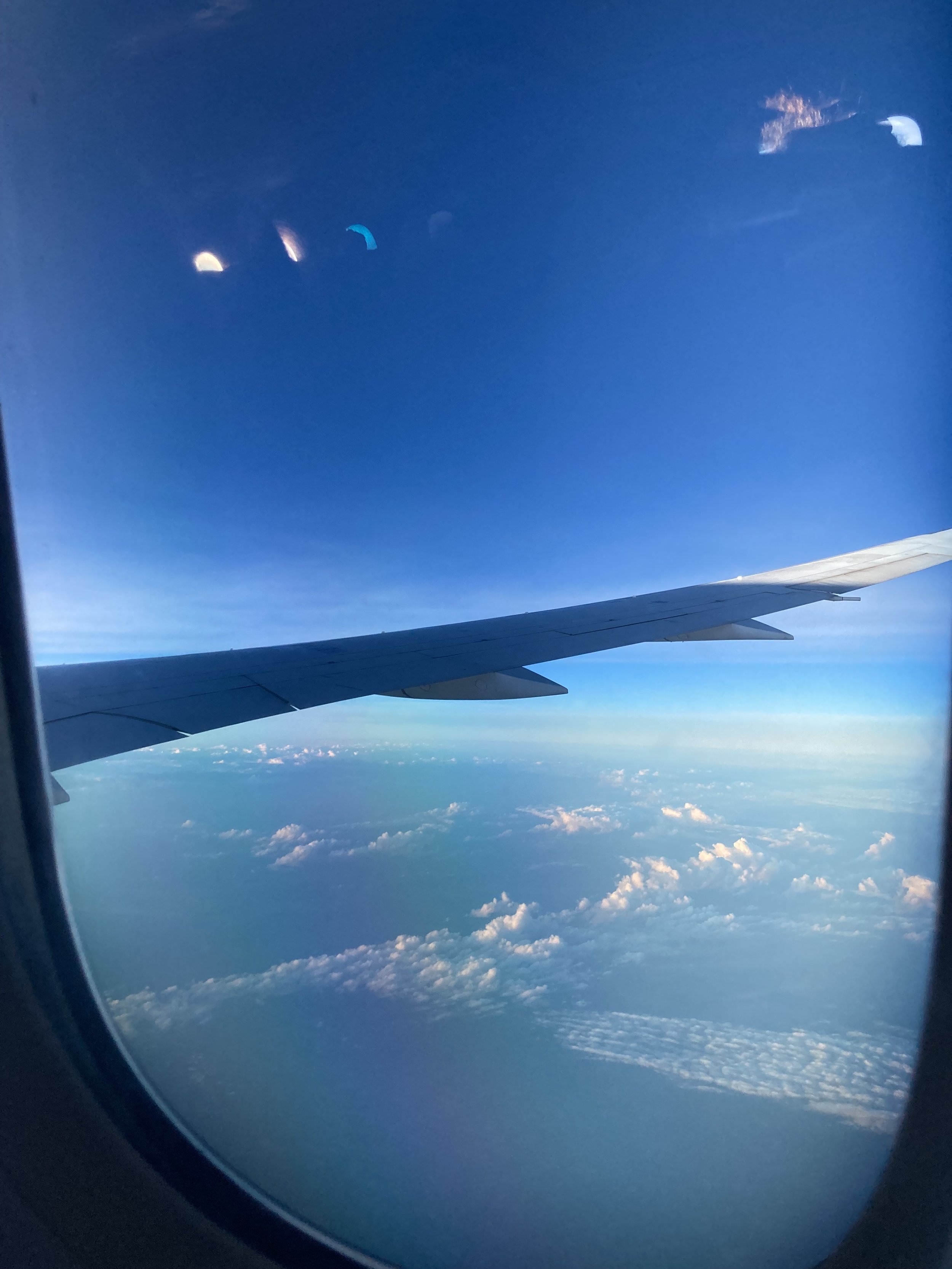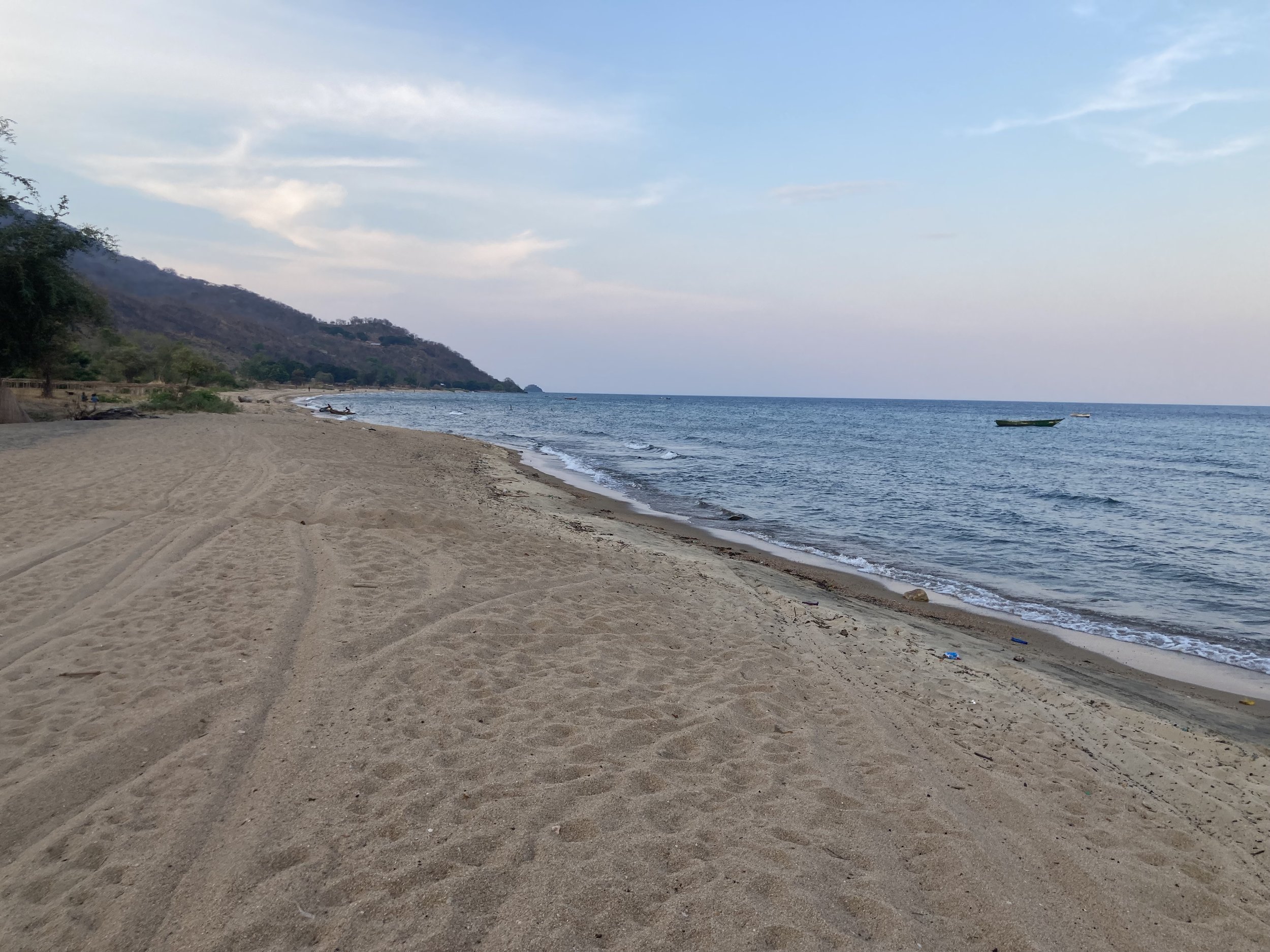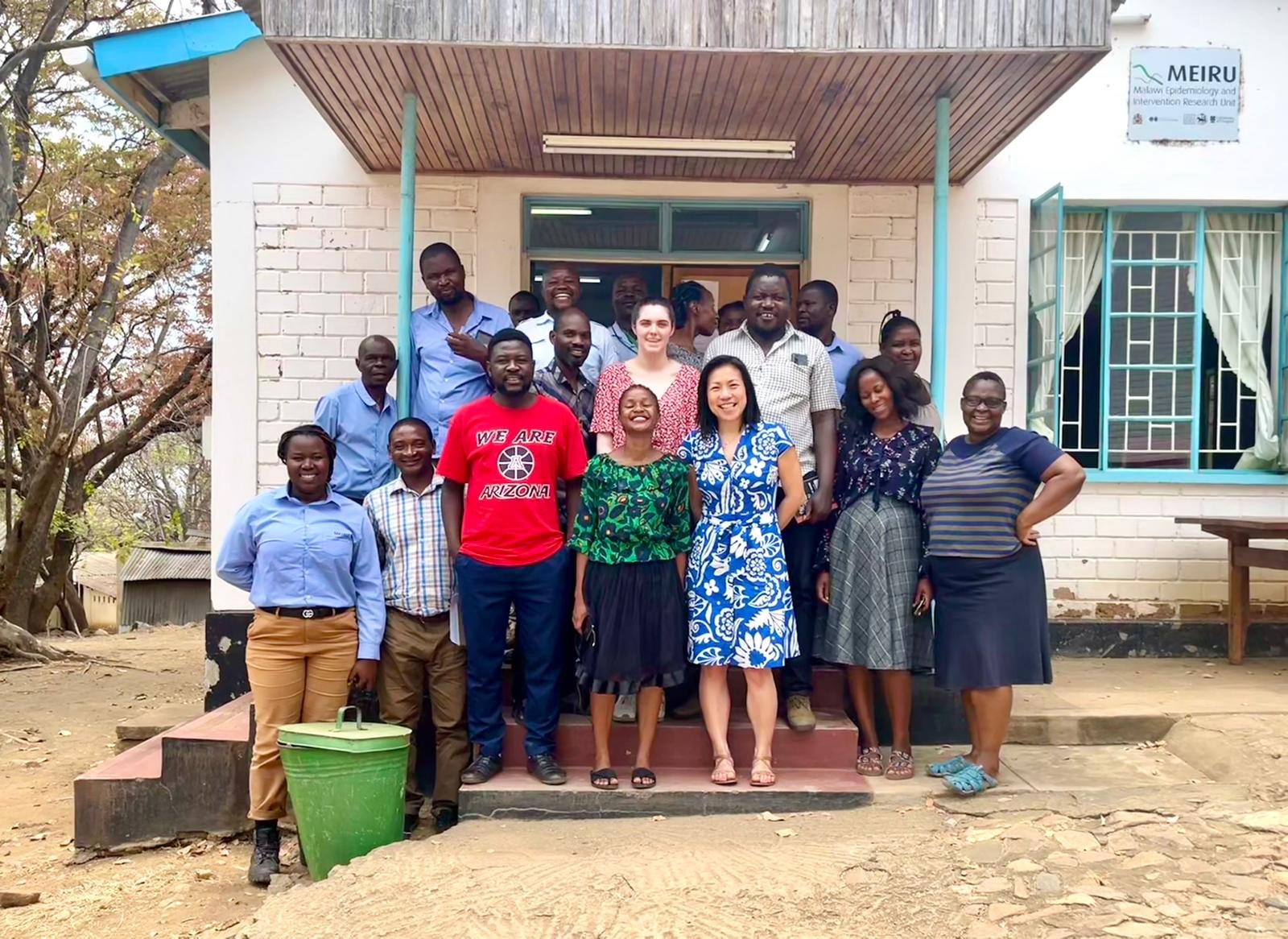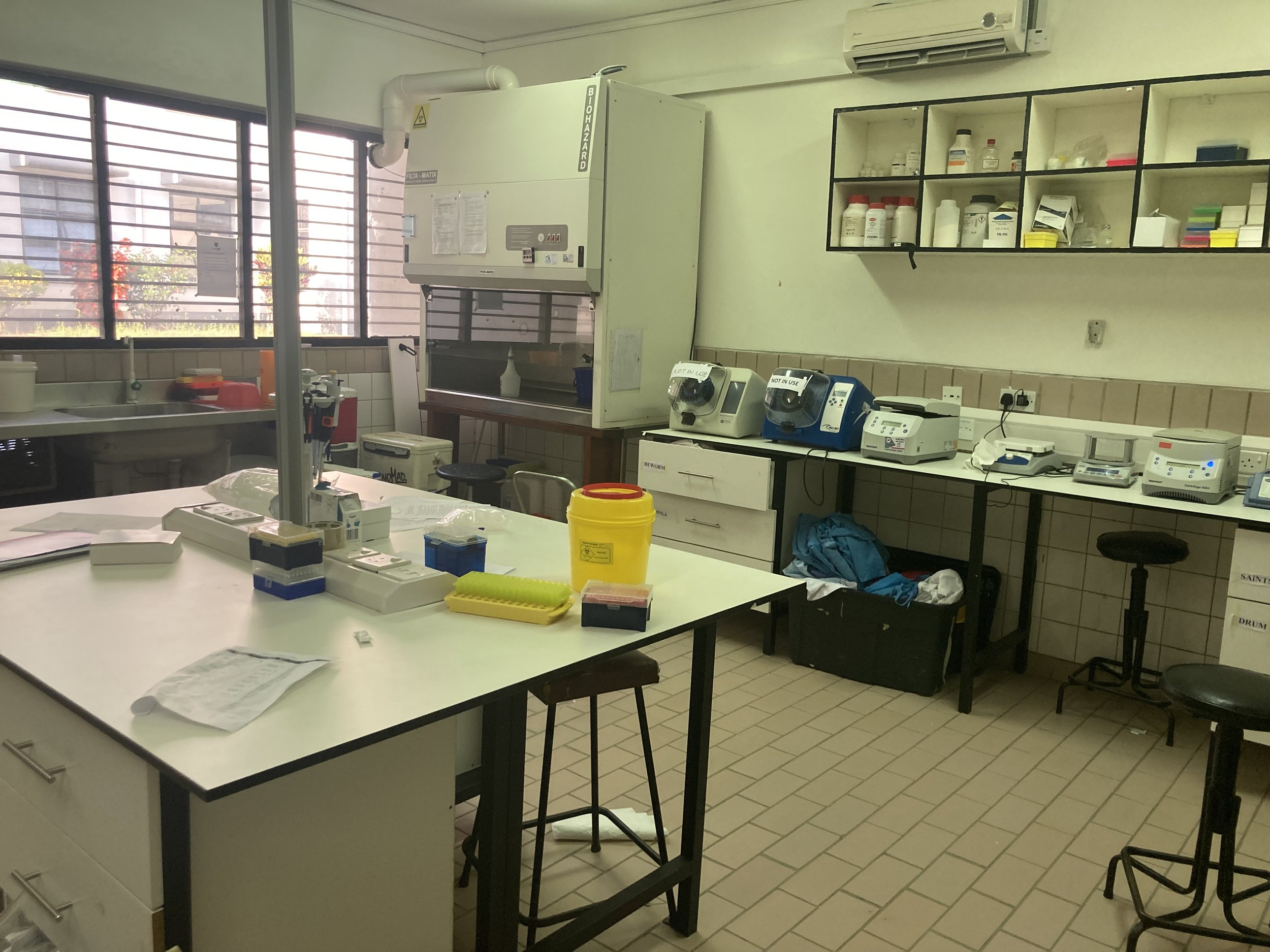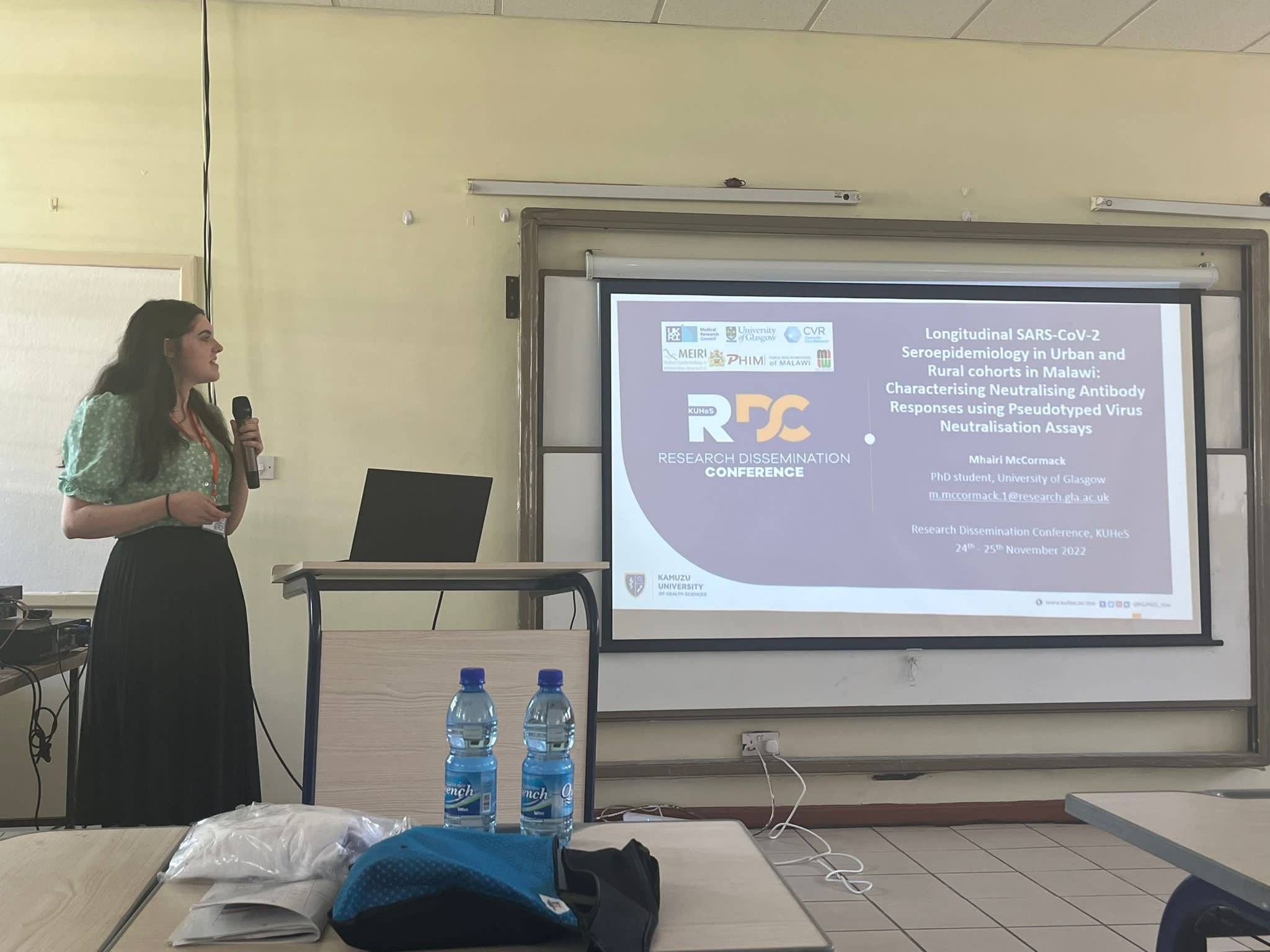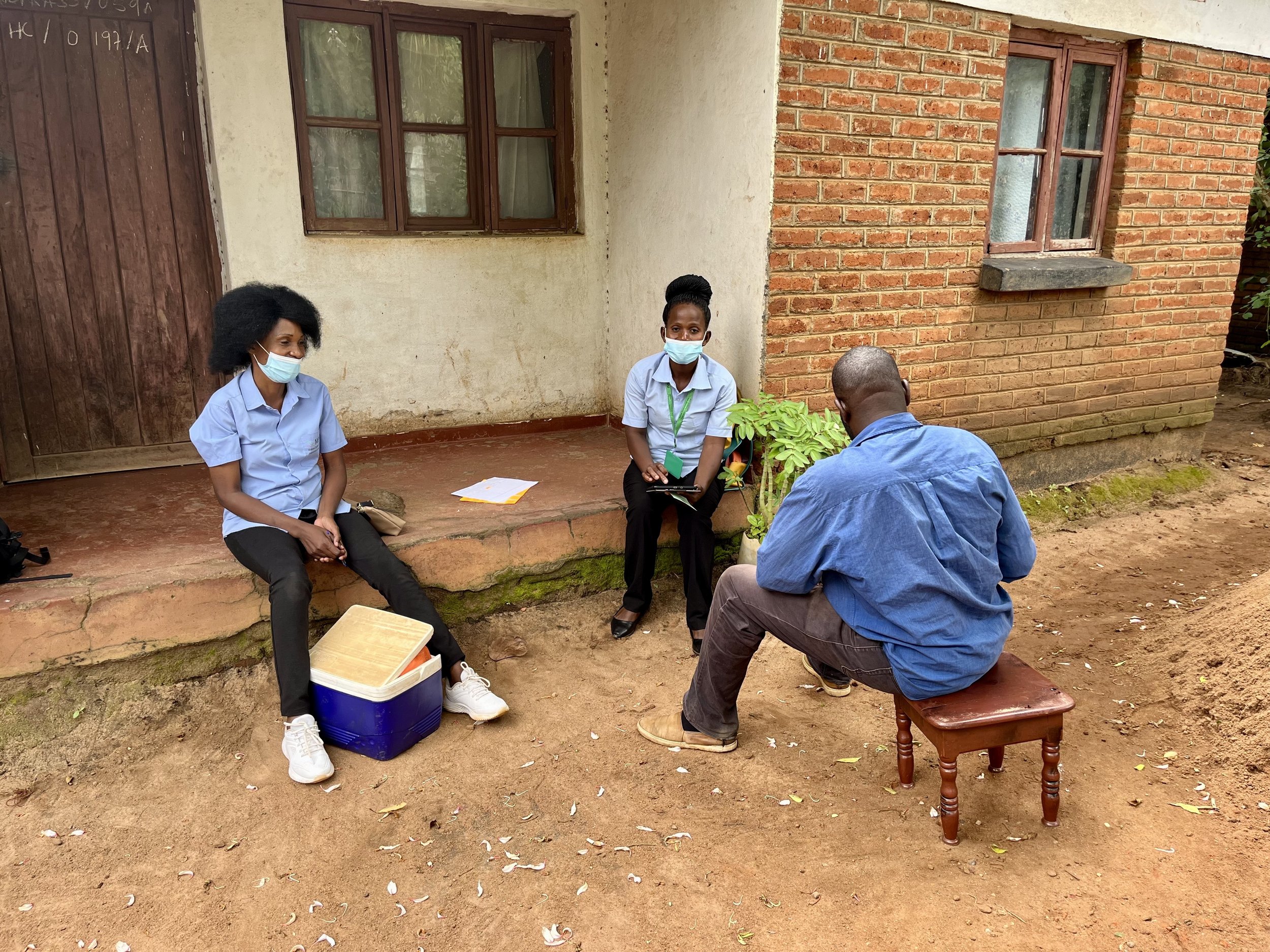
The Stories Behind the Samples – a PhD student’s trip to Malawi
6 flights, 5 presentations and one butt injection later, Mhairi returned from Malawi with not just some humbling experiences, but a greater understanding of her PhD project and a glimpse into what life is like for people living in one of the world’s poorest countries.
Having recently started my PhD project, which focuses on SARS-CoV-2 exposure in rural and urban Malawi, my supervisors thought it important to actually visit the country. Having been born and raised in Scotland, finding out about the different culture in Malawi, and seeing the struggles that they face as a very low-income country will be crucial when it comes to understanding the context of the research. And so, having never been outside of Europe before, in early November 2022, I set off on the 3-flight journey to Lilongwe, the capital city of Malawi.
Prior to the journey there was a surprising amount of preparation involved. Fortunately, I was travelling with one of my PhD supervisors (Dr Antonia Ho, Toni) who has lived in Malawi previously and took the lead in organising travel. My to-do list was dominated by visits to the travel clinic for vaccinations and antimalarial tablets; stocking up on travel sickness meds (I should probably mention that I can be motion sick going to Tesco, let alone Malawi); and sorting the many, many documents involved. There were also presentations to prepare for various meetings and a conference that we were attending at the end of our trip.
After a smooth journey and some recovery time, the first thing we did was visit the Malawi Epidemiology Intervention and Research Unit (MEIRU) offices in Lilongwe. We work very closely with this unit as the samples that we work on were collected from participants recruited by the MEIRU study teams from their urban and rural population cohorts. Toni and I presented an update on the findings from our laboratory work to members of the MEIRU team. We then met with the influenza surveillance lead at the Public Health Institute of Malawi (PHIM) and I listened in while he and Toni discussed the current and potential future projects, witnessing how to manage collaborations effectively and respectfully.
The view from the plane on the way to Malawi
The following day, I had the privilege of going out with the field team to visit the urban study site in Lilongwe. The first thing that struck me was how unlike my idea of a city this part of Lilongwe was. In Area 25, people don’t shop in fancy shopping centres, but crowded outdoor marketplaces. Children were collecting water from communal taps to take back to their families who often live together in one room buildings. I’d seen images and films depicting this before, but there’s an emotional impact of seeing it with your own eyes. After being shown around, the plan was to sit in on some interviews with participants. However, to respect a funeral that was occurring, work was unexpectedly halted for the day: an immediate example of how with field work, things are unpredictable and don’t always go as planned. I was able to join another study team that were still able to work and observe them collecting participant information from a household. The mother discussed how, in the last two weeks alone, on multiple occasions she went to bed on an empty stomach, not having money for any food that day. What was particularly upsetting was that she was pregnant and, as well as going hungry, she had neither a mosquito net nor anything to protect her from bites and life-threatening infections. After leaving the household, the field worker and I discussed just how common these sorts of situations are in Malawi. Amazingly, despite their circumstances, I found that people in Malawi have positive attitudes and are welcoming to visitors. They are very generous, even though many live in extreme poverty.
One of my favourite tales occurred during this same day. As some context, I have very pale skin, and during November, Malawi has temperatures around 30oC (safe to say, this is not what I’m used to). The research team had clearly made this realisation, so at any opportunity would guide me to the shade to protect my skin from burning. On one occasion, while waiting to be picked up from the field, we hid under a mango tree and two women brought us chairs to rest on. This interaction reinforced how kind and caring people are here, even to strangers.
Visiting the rural study site in Chilumba (at the North of the country) was next on our agenda. This site is right on the coast by Lake Malawi, which despite the potential risk of schistosomiasis, was too nice not to go swimming in. After presenting the same findings to the research team at this location, I was shown how they perform ELISAs (I am provided with data from these experiments and also perform them back in Glasgow). I was surprised just how similar their set up was. I think I anticipated that the equipment would be different or lacking with it being a low-income setting. However, this was not the case. During the incubation period, I had the chance to chat to the lab team and really start to understand what living and working in Malawi is like, the struggles they face in terms of politics and how this compares to Scotland. At the moment, Malawi has a huge petrol crisis, with an extremely low supply and completely unaffordable increased costs. At fuel stations, the queues stretch for miles and people often have to wait overnight to have any chance at getting fuel before it runs out. This is having knock on effects across the country. In Chilumba, it’s lowered the number of tourists which has decreased the income for many businesses.
The plan for the next day was to go out with the field team at the rural site. However, after feeling under the weather for a couple of days, I woke up quite unwell – vomiting and dizzy. The disappointing decision was taken to not go on that day’s site visit. This was definitely the right call as I continued to be sick until Toni managed to get a hold of an anti-sickness injection. And no, this isn’t your standard injection in the arm, it had to go into the muscle of my butt – an experience I don’t think I could forget if I tried! This really highlighted the pros of travelling with a supervisor who is also a clinician, not necessarily the type of supervisor/student bonding experience I anticipated though. At this point, we weren’t exactly sure what was making me sick, but as one of the guesthouse workers comforted me by saying, everyone gets sick on their first visit to Malawi, it’s to be expected. Later, Toni figured out that it was likely side effects of the antimalarials I’d been taking. We managed to switch to a different type and I soon felt much better.
On our way back to Lilongwe, we stayed in a lodge overnight. This place was completely off the grid with its own water supply and solar-powered energy (unsurprisingly, this is a bit more successful in Malawi than Scotland). It was a lovely break in a beautiful setting, and we even had the chance to go canoeing on the dam. We spent a day in Lilongwe doing our final prep for the conference before travelling down to Blantyre (a city in the Southern region) where it was taking place.
The first day in Blantyre was pretty busy! It started with a Zoom presentation to the Public Health Institute of Malawi Surveillance team, where Toni and I summarised the research findings on SARS-CoV-2 antibody responses in the urban and rural cohort, and highlighted the importance of the findings in terms of future COVID-19 vaccine policy. I then spent what remained of the day in a lab at the Kamuzu University of Health Sciences (KUHeS) where some experiments (real-time PCRs) are performed as part of the wider study that Toni is overseeing in Malawi. While being shown how this experiment is performed, the electricity kept cutting out, leaving us in darkness with no working equipment until the generators kicked in. Even with these technical difficulties, the experiment worked well, and we detected one sample that was positive for Schistosoma – parasitic flatworm.
Lilongwe study team in action
Lake Malawi, by the rural study site
Toni and I with the research team in Chilumba
Canoeing at Luwawa Forest Lodge
The laboratory at KUHeS
The conference began the following day. With this being my first conference, I had no idea what to expect, but was certainly surprised when the opening ceremony had a marching band and pyrotechnics. I have since had it confirmed that this is disappointingly not a normal occurrence, but one I would certainly encourage.
My oral presentation wasn’t till day 2, so I spent the first day listening to the keynote speakers, attending other people’s talks, and presenting a poster for a researcher who was unable to attend (I hope I did it justice, Elen). On day 2, I was surprised just how nervous I was about the presentation, considering I’d had plenty trial runs already. Although it didn’t go perfectly and there are things I’d like to change, I’m relieved to have my first conference presentation under my belt. Generally, what was great about this conference is that it covered a wide range of research: infectious disease; mental health; health systems and policy; and sexual health.
Presenting at the conference in Blantyre
After attending the closing ceremony, our work was done for the trip! We’d travelled across the country, being welcomed at every turn. I am very appreciative of the hospitality of the MEIRU team (lab and field researchers, guesthouse staff) who hosted our visit and took time out of their days to show me around. Thank you for looking after us with such care. Toni was staying in Malawi for another week, so I travelled back to Lilongwe with other researchers before flying out to Nairobi, Kenya in the early hours of the following day.
The journey back was long and tiring but gave me time to reflect on the trip and process all that I had seen. When thinking specifically about how this trip has changed my approach to the PhD, what comes to mind is that I have a greater understanding of the dataset as a whole. Prior to the trip, I felt slightly detached from the project, not knowing why certain data was collected and what it meant for the people (for example, that the number of fences a property has is indicative of social status). Now having these insights, I can analyse the variables appropriately and make more informed conclusions. Additionally, being able to visit the country and hear from Malawians directly about their lives and why research is important, provided great motivation for continuing the work. Witnessing the level of poverty that many people in Malawi endure while still maintaining a positive attitude was inspiring and a real lesson in appreciating what we take for granted in wealthier settings. Finally, on a personal level, I’ve learned that not everything will go perfectly to plan (butt injections and all), and that’s okay.

